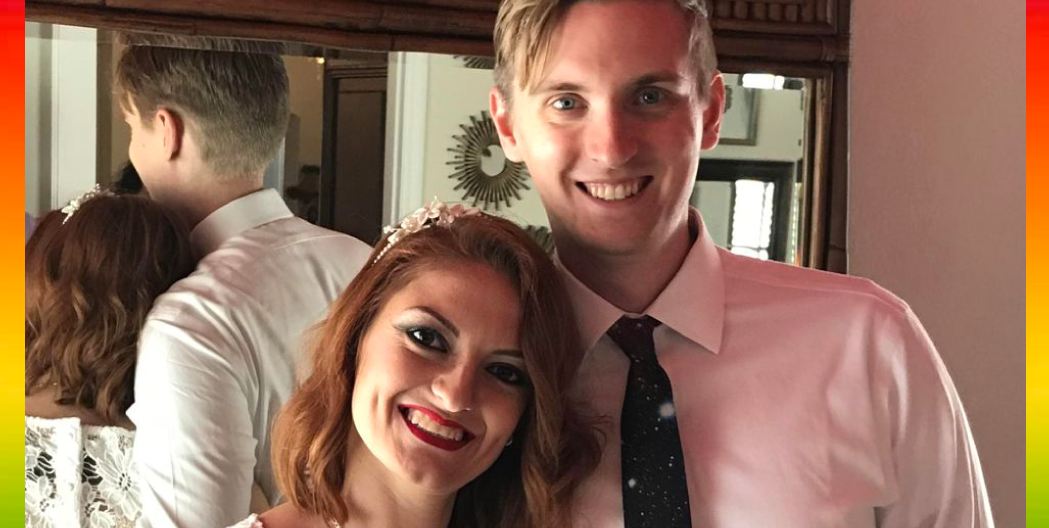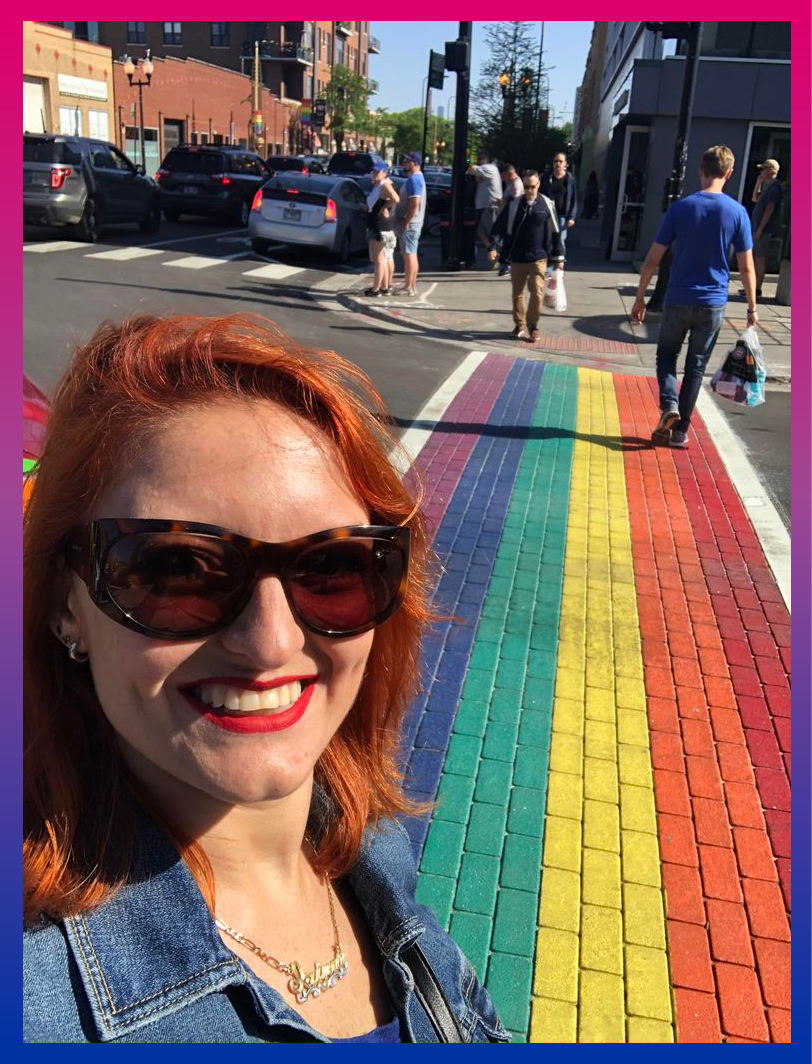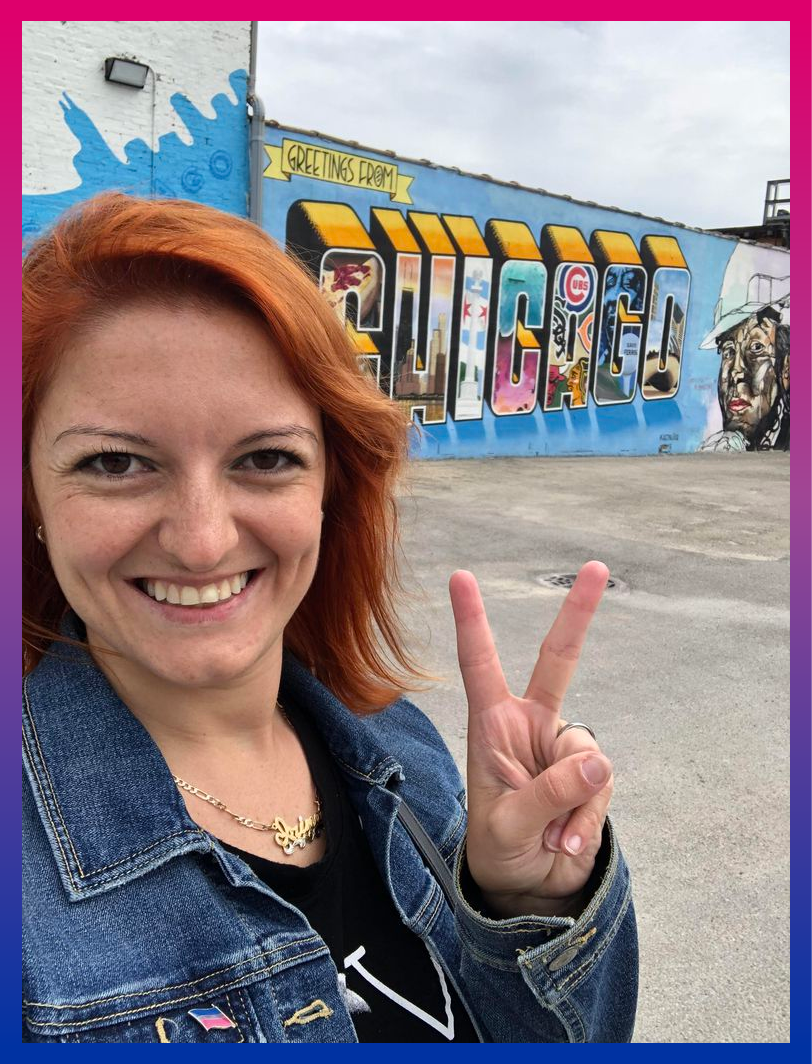Why I Celebrate Pride as a Bi Woman Who is Married to a Man

At OprahMag.com, we encourage our readers to authentically be themselves. So we’re commemorating Pride Month and the 50th anniversary of the Stonewall riots with Loud and Proud, a selection of voices and stories that highlight the beauty-and ongoing struggles-of the LGBTQ community. Here’s to celebrating every color of the rainbow.
When I first met my now-husband in April 2016, I made a point of telling him about my history of dating both men and women-and how I came out as bisexual at 16 years old to my friends and family, who offered mixed reactions. My friends were supportive; my family didn't quite understand. But that confusion I first encountered with my parents is a common reaction for anyone who identifies as a bisexual person.
Despite the growing acceptance and appreciation for LGBTQ diversity (80 percent of non-LGBTQ Americans support equal rights for our community, according to GLAAD), many people still don’t actually understand what bisexuality is all about.
So, since there's some confusion, I want to clear a few things up: A bisexual is a person who is able to form a relationship (typically physical, romantic, and/or emotional) with those of the same gender or those of another gender. For me, this means that I am attracted to both cisgender men and women, though I am also attracted to others (like trans women and men) on the gender spectrum. I knew I was bisexual long before I had sex or even dated. I knew this because, from a young age, I recognized that I was attracted to all kinds of different people.
However, dating as a bisexual woman can be really problematic, as pretty much every bi woman I’ve ever met can tell you.
Today, a lot of misunderstanding and stereotypes about bisexuality and bisexuals continue to perpetuate our culture. Here's a short but nowhere near complete list of some of the things that bisexuals tend to hear on a regular basis:
You just can't make up your mind between men and women.
You're choosing this identity to attract straight men.
You are completely sex-crazed.
You're just in a phase before fully coming out as gay.
You're not oppressed because you can be in a straight relationship.
For the record: None of these are true. But that doesn't stop people from constantly making assumptions about my bisexuality.
When I was single and dating, I received countless messages from straight couples looking for a "fun third" to join them in the bedroom. Typically, these requests started out with the female partner messaging me to get friendly, and then introducing the idea that her boyfriend/husband/male partner really wants to see her with a woman and/or participate in sex with two women. These messages continued to happen regularly despite me explicitly stating in my dating profiles that I was only interested in monogamous relationships.
Then there were the men who only chose to ask me out on a date because they hoped that, as a bisexual woman, I would have a girlfriend (or female friend, even) who would be interested in a threesome with them. Basically, there are a lot of threesome requests for bisexuals. And while I don't think there is anything inherently wrong with a threesome if that is what someone wants to do, it was frustrating to me that I received these requests over and over again, when all I wanted was to find my one true love (emphasis on "one").
Sometimes, I even encountered negativity from within my own queer community. Often, when I messaged gay women on dating apps, I received responses that they did not date bisexual women because they had been burned in the past by one who had left them for a man. While I understand why they're hurt, I was similarly hurt by their rejections simply because I was bi and not "totally" gay, as one woman put it.
Additionally, some queer women thought it was unfair that I was able to take advantage of straight-passing privilege when I dated men. It was all very frustrating and painful as I spent my 20s trying to date while also keeping true to my bisexual identity. But all of that turned around when I met Adam, a cisgender heterosexual male, and fell for him hard.
It turns out, though, that this wasn't the end of my bisexual troubles.
Now that I am married to a man, some people assume that I have finally "figured out" which gender I "prefer." Their assumption that my bisexuality all of a sudden disappeared or was no longer an issue-as if I could just choose to no longer be attracted to women now that I am married to a man-made me feel as if my entire identity was erased.
I felt this sudden pressure from the straight community to conform because, all of a sudden, I appeared straight. But I also faced pressure from the queer community, who seemed to reject me because of my new straight appearance. It's like my bisexuality was erased now that I was in a committed relationship with someone, because I finally "chose" a gender-but that's not what happened.
I married a man because my husband happened to be the person I fell in love with and, for the first time in my life, saw a future with. Not because he was male, mind you, but because he was the kindest and most generous human I have ever met in my entire life-and because the support and care I received from him made me into a better version of myself.
When we first met, I had been in recovery from alcohol misuse disorder for nine months and had recently had a relapse. Shortly after our first date, when I told him about my bisexual dating history and about my alcohol issues, he gave up alcohol in order to support me. Today, I am proud to say I haven't had a drink since my relapse before our meeting. At the time, I was trying to rebuild my life after hitting rock bottom-and he tirelessly supported my efforts to build a freelance writing career. In fact, he still reads all of my pieces and tells me how great my writing is (though, I admit, he's pretty biased).
Our love story progressed pretty quickly: We moved in together after a month and a half, got engaged a year later, and eloped nine months after that. To me, it felt and still feels like a "when you know, you know" moment.

Before I met my husband, I lived in New York City and attended Pride events every single year with my LGBTQ and ally friends. I loved going to the parade or walking around Greenwich Village and seeing rainbow flags everywhere.
When I met Adam, I had just relocated to Florida and, after we got together, wanted to continue to show up as a bisexual person in my community-which is why I've found it crucial to celebrate Pride Month as loudly and proudly as I can.
As a woman in the queer community who is in a heterosexual relationship, it can be difficult to figure out exactly what the appropriate outlet for your queerness is. This can be especially problematic for those who come out as bisexual or pansexual after already being in a heterosexual relationship, as it happened to Diane Glazman, 53, from the San Francisco Bay Area. She was in her mid-20s and already married to a "cis-het guy," as she puts it, before she realized she was bi. Still, it took many years before her queer identity grew enough for her to come out-and it wasn't until she realized that she was alternating her language when talking to straight friends versus queer friends (a practice known as "code-switching") that she knew she had to finally be honest about who she is.
"Following the Pulse nightclub shooting, I realized I fully identified as a member of the LGBTQ community and decided to come out publicly as bi," Glazman says. "Until I stopped code-switching with my straight friends, I didn’t realize how much I changed my language or way of being to hide this part of myself. Not doing that has been very freeing."
Having the power to speak out about one’s queer identity while in a heterosexual relationship has been one of the saving graces for me. My husband knew from the very beginning that I identified as bisexual and knew about my history of dating both women and men. For me, just as Glazman says, not hiding this part of myself is freeing.
I accomplish this "not hiding" by attending Pride events in my small community in southwest Florida-and by having my husband join me every year. Shortly after we started dating, we had our first-ever Naples Pride (his first Pride!) and have been going together ever since. This year, he even insisted we go despite a rainy morning and the fact that the event was outside. But we had a lot of fun together, as we always do, and I even got to support a couple of LGBTQ-friendly local businesses by buying a new collar for my dog at a store’s booth during the Pride festival, as well as purchasing my first-ever Bi Pride flag pin, which I now proudly wear on my jacket.
As Dr. Liz Powell, PsyD, a licensed psychologist, author, and speaker based in Portland, OR, put it, after she encouraged me to wear Pride colors or gear that represents my identity, "Put your money where your mouth is and buy things from queer companies."
And I'm not the only queer woman in a relationship with a man who finds it important to celebrate Pride Month-even if they're newbies.
"This year, I got to go to the first-ever Pride event in Martinsville, Virginia, which was awesome to be a part of," says Ceillie Simkiss, from Danville, VA, who is a pan-romantic asexual cisgender woman engaged to a cisgender straight man.
Meanwhile, others prefer to do a little more than just go to Pride events. They organize them!

"To cheer myself up, and to lift up our own small queer community, I organized the first Pride event in our area," says Stefanie Le Jeunesse, 38, from Mount Vernon, WA, who is partnered with a cisgender heterosexual man and has three children with him. "We’re now planning our third annual parade and resource fair, and we’ve got a small committee, and buy-in from several local businesses and organizations."
Unfortunately, it's not all rainbows and Pride flags.
Despite our Pride Month celebrations and my continued openness about my bisexuality, being in a heterosexual relationship has occasionally made me feel like a "bad" queer person. After the rejection I faced from gay women who wouldn't date me, I now feel added pressure to assert that I am still a member of the queer community even though I appear to be straight to the outside world. I'm afraid that, eventually, being straight-passing will make the LGBTQ community turn its back on me. Turns out, I was suffering from internalized bi-phobia.
"One thing I want bi folks to get out of the habit of doing is telling themselves they are straight-passing," says Sonalee Rashatwar, LCSW MEd, a clinical social worker who is bisexual herself and based in Philadelphia, PA. "That is some bi-phobic nonsense that perpetuates this idea that bi women are secretly straight and bi men are secretly gay because we can't imagine a cis-heteropatriarchal world that doesn’t center and pedestalize cis male pleasure."
This erasure of my bisexuality (and the guilt that comes with that) is an unfortunately common problem faced by other bi people, says Dr. Powell. "Bi erasure is a serious problem that gets worse when bi folks are in relationships others read as straight," she said. "Queer folks may consider you less queer, or say you have 'passing privilege,' when really what you have is invisibility. A lot of bi folks struggle to stay connected to queer community."
Thankfully, I have a supportive husband who not only tolerates my bisexuality but celebrates it as an integral part of my identity. It makes it easier to stay connected to the queer community when I have a partner who helps me celebrate all those parts of me-whether that means attending Pride events together or planning to teach our future kids about the wonderful world of LGBTQ people. Thankfully, I have a few examples to turn to before we even get there.
For some bisexual women in straight relationships, celebrating Pride involves not only their husbands (who tend to be supportive) but also their children.
"I bring my two young kids to rallies, marches, and queer events whenever I can-so Pride is a really important cultural celebration for us," says Brianna Sharpe, 39, of Alberta, Canada. "We love preparing for Pride events by making signs, hunting rainbow gear, and dressing up as a family."
Priscilla Blossom, 34, of Denver, CO, agrees. "I’ve been teaching my 5-year-old son more about gender this year-dispelling gender binary myths like 'pink is for girls, blue is for boys' and such. We’ve been reading a lot about gender identity and expression via books like It Feels Good to Be You by Theresa Thorn, Introducing Teddy by Jessica Walton, and When Aidan Became a Brother by Kyle Lukoff, and I think what makes me happiest is that to him, it isn’t a big deal," she says. Her family lives in Denver’s gayborhood, so she loves seeing rainbow flags and queer-friendly bars as the norm. This year, her family went to the local Pride parade and also indulged in a local tavern’s "slice of LGBT cake" at her straight husband’s insistence.
Although I find it most meaningful to go to my local Pride events with my husband, and to continue to be outspoken about my bisexuality online and in real life, there is no right or wrong way to celebrate Pride for those who are queer but in heterosexual relationships.
"Celebrate away!" says Stephanie Maria Peña, LMSW, a psychotherapist based in Brooklyn. "They can do the same things queer couples can do: Go to a march, a party, the beach-celebrate however you’d enjoy and find meaningful. Some folks want to share it loud and proud while some are a little more reserved or hesitant due to the fact that Pride has become very commercial. It’s ultimately an individual decision if folks want to celebrate or not."
I think perhaps Brianna Sharpe put it best when she said, "I know at Pride, we might look like just another hetero family, and sometimes this brings anxiety, but I’m raising my kids to know not to assume things about others, and I hope we all remember to do the same this Pride season."
For more stories like this, sign up for our newsletter.

